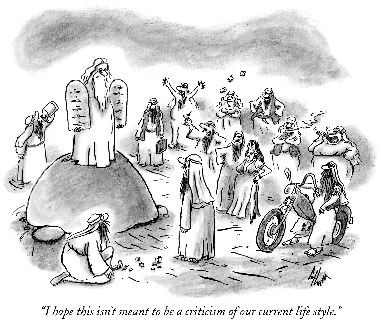Century Marks

Required course? Last fall, a task force redesigning general education at Harvard proposed requiring a course on religion. The proposal noted that students often have difficulty making sense of their own religious beliefs in relation to their intellectual world, and that religion is central to many of society’s contentious debates. The task force has since rescinded its proposal, suggesting instead a required course on what it means to be human. The committee denies that this change of direction was a response to criticism. But one professor charged that “secular and liberal Harvard rebelled” at the religion requirement (Boston Globe, December 13).
Top Americans: Atlantic magazine compiled a list of the 100 most influential persons in American history by asking 10 historians to create their own list. Predictably, the top five in the list were Abraham Lincoln, George Washington, Thomas Jefferson, Franklin D. Roosevelt and Alexander Hamilton. Only one historian of religion was included in the selection process—Mark Noll, professor at Notre Dame. And although many of the top 100 leaders were deeply religious, only six religious leaders made the cut: Martin Luther King Jr. (no. 8), Joseph Smith (no. 52), Brigham Young (no. 74), Mary Baker Eddy (no. 86), Jonathan Edwards (no. 90) and Lyman Beecher (no. 91). It may be quintessentially American that three of these six (Smith, Young and Eddy) either founded or helped found a new religion (Boston Globe, December).
What about the cross? Some religious groups are urging Wal-Mart to discontinue selling Left Behind: Eternal Forces, a violent video game based on the Left Behind novels. The game takes place after most Christians are raptured; those left behind must decide whether to join or combat the forces of the Antichrist. The object of the game is to kill or convert the opposing forces. Makers of the game claim that the violence is only defensive. Their Web site (www.leftbehindgames.com) says that “Christians are quite clearly taught to turn the other cheek and to love their enemies. It is equally true that no one should forfeit their lives to an aggressor who is bent on inflicting death.” Tell that to Jesus (Chicago Sun-Times, December 14).
What’s wrong with this picture? A November poll conducted by Zogby and the American Bible Society found that 85 percent of Americans want more religious values and references to the Bible and less sex and violence on television. In the same month Nielsen reported that Desperate Housewives, CSI: Miami, Grey’s Anatomy, Criminal Minds, Law and Order: SVU and Two and a Half Men were among the top ten rated TV shows (DallasNews.com).
Nun other: Andrea Jaeger became a professional tennis player when she was only 14. Two years later she was the second-best women’s player in the world. But she quit tennis at 21, after seven shoulder surgeries. Subsequently, she started the Little Star Foundation, which helps seriously ill, abused and at-risk children. Then this past September she became an Anglican Dominican nun. She told Sports Illustrated (December 11) that after receiving a theology degree she had had a dream in which God called her to become a Dominican nun.
War divides: Aaron Asher, who edited President Lyndon Johnson’s memoirs, said that on his last visit to the Johnsons’ Texas ranch the former president scoffed at President Nixon’s plans to turn the war over to the South Vietnamese. He said they’d lose Vietnam to the communists, who would then take over the Philippines and invade Hawaii. He morosely predicted that his grandson would end up needing to fight the communists. After a period of silence Lady Bird Johnson spoke up, suggesting that the Vietnamese would have so much on their plates that they would turn inward. In effect, she was challenging the domino theory on which all of Johnson’s decisions about the Vietnam War rested. Asher wondered later whether the Johnsons had been divided over the war for some time—like many other American families (American Heritage, December).
Don’t bring your gun to church: The pastor of a Baptist church in Mt. Airy, North Carolina, was arrested for taking a pistol into his pulpit. He had a previous conviction involving cocaine and possession of a firearm. The pastor claimed that he was using the gun as a prop. “Once I pretended to be a blind man with a cane, glasses and can with coins. Why didn’t they arrest me for impersonating a blind man?” (Atlanta Journal-Constitution).
Pastoral plagiarism: Pastors using the sermons of other preachers without attribution isn’t new. What is new is the widespread availability of sermons on the Internet—some for free, others for sale. One Web site posted an essay by Steve Sjogren in which he argued that pastors don’t need to be original, they just need to be effective. The trend in clerical plagiarism may stem in part from the need many pastors feel to be entertaining in the pulpit. The key issue here is integrity, says Ray Van Neste, a professor at Union University in Tennessee. Many congregants feel betrayed when they discover that their pastor has been using material from other sources without attribution (Wall Street Journal, November 15).
In print: Jill Peláez Baumgaertner, the Century’s poetry editor, has just published a chapbook of her poetry, My Father’s Bones (Finishing Line Press). Poet Sydney Lea says Baumgaertner’s poetry “shows us that our aim as mortals is not only to understand God’s grace but daily to rediscover adequate means of articulating it to ourselves and others. At their darkest, then, Baumgaertner’s poems remain a joyful noise unto the Lord.”
Correction: In “CC recommends” (December 12) Harold Bloom was mistakenly referred to as the “late Bloom.” Our apologies to the prolific and very much alive Professor Bloom and to readers.




